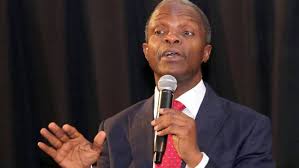The Vice President, Prof. Yemi Osinbajo, today disclosed that the country’s tax revenue increased by 51 per cent in 2017, attributing the year- on-year growth to aggressive tax drive by the Federal Government.
Osinbajo made the disclosure at the FT Nigeria Summit on “Dispelling Uncertainty and Building Resilience’’ in Lagos.
The Vice President, who spoke on the topic “Nigeria beyond oil- The pathway to transformation’’, noted that the government had diversified the economy to ensure broad-based development.
According to him, the increase of 51 per cent in tax revenue is exclusive of the oil earnings.
He project that the nation’s tax to Gross Domestic Product (GDP) ratio would be above six percent this year based on going revenue generation from tax source, adding that Nigeria’s current debt profile is still small and should not cause anxiety.
Specifically, the Vice President pointed out that the country’s debt to GDP now stood 21 per cent, compared with Ghana’s about 70 percent, South Africa’s 50 percent, USA 101 per cent.
This is even as he disclosed the country’s debt to revenue ration declined from 60 percent in the past to 34 percent by last November.
He clarifed: “The reason why we have the alarmists is because this is only a snapshot, if you take a snapshot of Nov. 2017, you are not looking at revenue, you might say that the debt is very high.
“So, you cannot respond to these things by snapshot because you are not taking into account the revenue. Our external debt is not something we should worry about, we have managed debt very well’’, the Vice President added.
He also restated the present administration’s commitment to the development of local capacity through implementation of various initiatives in the Economic Recovery and Growth Plan (ERGP).
In his remarks, Managing Director, Financial Times Live/Global Conferences & Events, Mr. James Gunnell, said that the summit would help in creating more awareness about Nigeria’s economic and investment climate.
According to him, the summit would also enable senior policy makers, major international investors, multilateral organizations and other stakeholders to make recommendations and realistic solutions to the country’s current development challenges.






